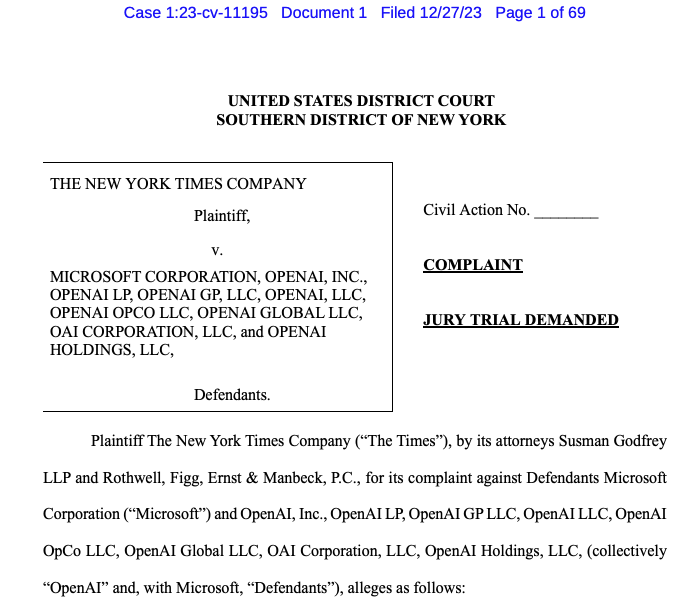Massive AI-led Changes to the Internet: The NY Times vs. OpenAI Lawsuit
Breaking News
The ongoing lawsuit between the New York Times (NY Times) and OpenAI is sending shockwaves through the internet, heralding significant artificial intelligence (AI)-led changes. This legal battle has highlighted the immense data requirements of large language model-based AI applications, which have traditionally relied on freely extracted data.
You may also like to watch : Who Is Kamala Harris? Biography - Parents - Husband - Sister - Career - Indian - Jamaican Heritage
The NY Times, a renowned media outlet, and OpenAI, a leading AI research organization, have clashed over the use of data in developing AI models. OpenAI, known for its advanced language model GPT-3, has been utilizing vast amounts of publicly available data to train its AI systems. However, this practice has raised concerns about intellectual property rights and fair compensation.
Large language models like GPT-3 need extensive datasets to learn and generate human-like text. These models analyze and process enormous amounts of text data to improve their language understanding and generate coherent responses. OpenAI has been able to leverage freely available information from the internet, including news articles, books, and websites, to train their AI systems.
The NY Times, as a prominent news organization, has voiced its concerns about OpenAI’s use of its copyrighted content without consent or compensation. The lawsuit alleges that OpenAI’s AI models have been trained on a substantial amount of NY Times’ articles, leading to potential copyright infringement and the unauthorized use of their intellectual property.
This legal dispute has far-reaching implications for the future of AI development and data usage. It raises questions about the rights of content creators and the ownership of information in the digital age. The outcome of this lawsuit could reshape the landscape of AI research and development, as well as establish new guidelines for the use of copyrighted material in training language models.
You may also like to watch: Is US-NATO Prepared For A Potential Nuclear War With Russia - China And North Korea?
OpenAI’s GPT-3 has gained significant attention for its ability to generate coherent and contextually relevant text. It has been used in various applications, including content creation, customer service chatbots, and language translation. However, the lawsuit has cast a shadow over the ethical and legal foundations of these AI applications.
The implications of this lawsuit extend beyond the NY Times and OpenAI. It raises broader concerns about data privacy, intellectual property rights, and the responsibility of AI developers. As AI becomes increasingly integrated into our lives, it is crucial to establish clear guidelines and regulations to protect the rights of content creators and ensure fair compensation for their work.
The outcome of the NY Times vs. OpenAI lawsuit will undoubtedly have a profound impact on the AI industry and the future development of language models. It is a pivotal moment that has forced stakeholders to reflect on the balance between innovation, data usage, and intellectual property protection.
In conclusion, the legal battle between the NY Times and OpenAI has exposed the significant challenges surrounding data usage in AI development. The outcome of this lawsuit will shape the future of the internet and establish new precedents for the use of copyrighted material in training large language models. As the AI industry continues to evolve, it is essential to strike a balance between innovation and the protection of intellectual property rights.
.

BREAKING: The @nytimes vs. @OpenAI lawsuit signs massive AI-led changes to the internet as we know it. Here’s what’s happening:
Large language model-based AI applications need huge amounts of data to be developed, and so far, most of the data has been extracted for free from… pic.twitter.com/TlRe4jcwbp
— Luiza Jarovsky (@LuizaJarovsky) December 28, 2023
Source
@LuizaJarovsky said BREAKING: The @nytimes vs. @OpenAI lawsuit signs massive AI-led changes to the internet as we know it. Here's what's happening: Large language model-based AI applications need huge amounts of data to be developed, and so far, most of the data has been extracted for free from… twitter.com/i/web/status/1…




